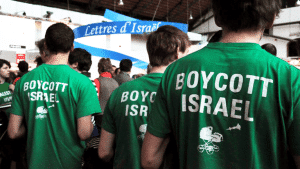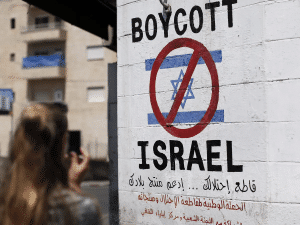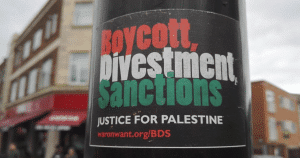PNN – The war in the occupied territories and the intensification of the blockade of Gaza have brought the “Boycott, Divestment and Sanctions of Israel” movement, abbreviated as BDS, into the spotlight again; All over the world, there are plans to boycott the brands of the Zionist regime and the companies that support it, but not all of them are closely related to this campaign, although they are aligned in practice.
According to Pakistan News Network, last month, in the middle of the Gaza war, Asian countries have sanctioned companies related to the Zionist regime or companies that financially support this regime.
More than 22 countries have officially intensified sanctions against brands supporting this regime, with Asian and Muslim countries being the flagships of this movement. The governments of Malaysia, Indonesia, Maldives, Pakistan, Brunei, Bangladesh, Afghanistan, Yemen, Syria, Oman, Lebanon, Bahrain, Kuwait, Iran, Iraq, in Asia are reluctant to enter into contracts, cooperation and purchases from the sponsors of the Zionist regime.
Human rights activists in Indonesia and Malaysia called for a boycott of “pro-Israel” products in a humanitarian move to pressure the Zionist regime to stop its attacks on Gaza. Not long ago, a video was published online showing that the people of Malaysia protested against the boycott of the products of the companies supporting the Zionist occupation regime in a creative way by installing the pictures of Gaza martyrs on the products of these companies.
The Boycott, Divestment, and Sanctions of Israel movement is a tactic, not an organization, so disparate groups have their own campaigns that may focus on a different set of goals, though they all share the same tactics of peaceful resistance. The program draws direct inspiration from South Africa’s anti-apartheid struggle and the American civil rights movement, both of which used boycotts effectively. Part of the order of this program is to shake the West’s support for the Zionist regime.

Background
The first international call for a Boycott, Divestment in Israel movement was launched in 2005 by more than 170 Palestinian groups to gain international support for the rights of the Palestinian people.
On its website, the movement describes itself as “an inclusive human rights and anti-racism movement that is fundamentally opposed to all forms of discrimination, including anti-Semitism and Islamophobia.”
According to the United Nations Relief and Works Agency for Palestinian Refugees, more than 4 million Palestinian refugees have been displaced since the establishment of the Zionist regime.
Labor unions, farmers’ unions, students and academics, artists, climate justice groups, indigenous justice networks, and many other groups have taken up the cause of the Boycott, Divestment, and Sanctions of Israel movement. The movement’s website home page lists seven American groups aligned with the idea, including Jewish Voice for Peace, Democratic Socialists of America, and the American Campaign for Palestinian Rights.
Three main goals have been introduced for this movement:
– Ending the occupation and colonization of all Arab lands and dismantling the wall
– Recognizing the fundamental rights of Palestinian Arab citizens in the occupied territories in full equality
– Respecting, supporting and promoting the rights of Palestinian refugees to return to their homes and properties as stated in United Nations Resolution 194.
“Wall” refers to the structure separating Israeli and Palestinian settlements in the West Bank. While Israel says it built the wall for security purposes, the Palestinians say it allows them to annex more territory. The International Court of Justice had previously declared that “Israel must stop violating its international obligations by stopping the construction of the wall.”
The approach of the Boycott, Divestment and Sanctions of Israel movement ranges from individual actions, such as boycotting certain goods and companies, to global action that calls on governments to impose sanctions against Israel.
The movement’s sanctions include not only Israeli products and companies, but also non-Israeli corporate giants that the movement believes are complicit in the oppression of Palestinians. Different movement groups around the world may list different companies and goods to boycott, but the National Committee of the Boycott, Divestment and Sanctions of Israel movement focuses on several strategic targets at a time.
The Boycott, Divestment and Sanctions of Israel movement has in the past convinced several high-profile companies to stop selling in the Occupied Palestinian Territories, and convinced the French telecommunications company Orange to end its business partnership with the Zionists. One of the companies accused of mistreating its Palestinian employees closed its factory in the West Bank in 2014.

The importance of the issue
Sanctions against Israel go deeper than just checking customers’ purchases in the store, the Boycott, Divestment and Sanctions of Israel movement asks its supporters to refrain from attending cultural institutions of the Zionist regime and even from cooperating with Israeli universities and scientific and research centers that are suspected.
One of the most frequently used strategies of the Boycott, Divestment and Sanctions of Israel movement is to encourage musicians, artists and other celebrities not to travel to the occupied territories.
The movement pressures companies to avoid doing business with Israeli companies, investors to keep their capital, and banks and pension funds not to use customers’ money to invest in the Israeli economy. In the past, the campaign has successfully forced state pension funds in Luxembourg, New Zealand and Norway to divest from the Zionist regime.
In another part, this movement calls for sanctions against Israel, which include an embargo on the provision of weapons and military aid, as well as the suspension of trade and diplomacy with Israel. Proponents say this is a critical moment to put pressure on political leaders, especially the US government.
According to the report of the US Congressional Research Service, this country has sent 158 billion dollars in aid to the Zionist regime. Meanwhile, the White House has resisted calls for a cease-fire in Gaza and in recent days vetoed a UN Security Council resolution calling for a “humanitarian pause” in Gaza.
It is not clear how much this movement of boycott, non-investment and embargo on Israel will affect the economy of the Zionist regime. A 2015 report from global policy think tank “Rand Corporation” estimated that Israel’s gross domestic product will lose about $15 billion due to non-violent Palestinian resistance, which includes the boycott, divestment, and embargo movement, but this sector It is a small part of Israel’s current GDP, which is estimated at more than 500 billion dollars.
Bloomberg recently reported that foreign investment in Israel has dropped significantly in 2023, likely influenced by political and social turmoil in the country. Judicial reforms proposed by Israeli Prime Minister Benjamin Netanyahu led to widespread protests by Jewish citizens in the occupied territories earlier this year.
The Boycott, Divestment, and Sanctions movement against Israel has faced a lot of criticism, for example, one of the common arguments against it is that it hurts the Palestinians more than it helps them by further reducing jobs and other economic opportunities in the occupied territories. Some opponents also argue that the movement wants to end the conflict without considering the right of self-determination for Jews.
In response to these accusations, the Movement has said that criticizing the “violation of international laws” by the Zionist regime should not be confused with anti-Semitism, Israel is a regime, not a person. Everyone has the right to criticize the unjust actions of a regime.
The Zionist regime has tried to suppress the efforts of the boycott movement, non-investment and boycott of Israel from the very beginning, in 2017, this regime approved a law based on which people who support the boycott of this country are prohibited from entering Israel.
In 2019, the non-profit Jewish National Fund for Israel filed a lawsuit against the US Campaign for Palestinian Rights, using the US Anti-Terrorism Act, which allows victims to seek damages from groups that have aided or abetted terrorism. This fund identified the members of this campaign as material supporters of terrorism led by Hamas and Palestinian Islamic Jihad. Of course, this complaint was rejected in 2021.
In 2017, 43 American senators proposed a bill with the support of the American Israel Public Relations Committee (AIPAC) lobbying group that would criminalize boycott, disinvestment and boycott of Israel with a sentence of up to 20 years in prison, although the US Congress did not approve any of them.

Assessment
While a majority of Americans still support Israel more than Palestine, according to past polls, a recent poll found that less than half of respondents want to send weapons and equipment to Israel.
Some experts say that American citizens may not understand what the boycott, divestment and embargo movement means, but they may support that their tax dollars are not spent on funding the Israeli military.
In the current war in Gaza, the movement has called for boycotts of some of the largest and most visible multinational corporations, including McDonald’s, Puma, Google, Disney and Amazon.
Strategically, the movement aims to focus on “a smaller number of carefully selected companies and products for maximum impact.”
Many of the very long lists posted on social media do the exact opposite of this strategic and influential approach, the movement says, adding that they can be ineffective.

